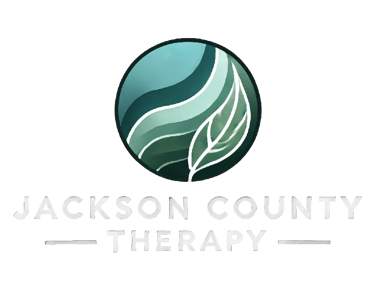
Trauma-Informed Care for Vets & Trauma Survivors
At Jackson County Therapy, we approach healing with compassion, respect, and deep clinical experience. Our therapists are trained in trauma-informed care and specialize in evidence-based modalities such as EMDR, ACT, and DBT. We tailor each treatment plan to the individual, respecting your pace and goals, while creating a safe space for growth.
Whether you're navigating the lasting effects of trauma, living with PTSD, or unsure where to begin, we’re here to support you. From your first consultation, we’ll explore your needs and work with you to find the most effective approach. We accept OHP (Medicaid), Medicare, and several private insurances — and offer telehealth or in-person sessions to meet you where you are.


Trauma can take many forms — from a single overwhelming event to chronic experiences of adversity, abuse, or neglect. Whether it’s a childhood trauma, loss, violence, combat, or ongoing systemic stressors, the impacts can ripple through every part of life. Trauma affects how the brain processes emotion, memory, and safety. The amygdala may become overactive, the nervous system dysregulated, and the prefrontal cortex — responsible for regulation and logic — may struggle to stay engaged during stress. These neurological changes can lead to anxiety, depression, emotional dysregulation, and difficulty forming trusting relationships.
Trauma-informed therapy is not about re-living painful events. It’s about reclaiming safety, developing coping skills, and learning how to regulate emotional responses that were once protective but are no longer serving you. We approach all clients through a lens that honors the impact of trauma and avoids re-traumatization. Our care is collaborative, empowering, and grounded in both compassion and science.
Understanding Trauma and it's effects
Trauma-Informed Therapy at Jackson County Therapy
Therapy for Veterans and Their Families
Veterans often face unique challenges when transitioning to civilian life or coping with the aftereffects of service. PTSD, moral injury, grief, and feelings of isolation or hypervigilance are common among those who have served — and often go unspoken or misunderstood. At Jackson County Therapy, we’re proud to serve veterans and their families with the empathy and specialized training these experiences require.
Our lead clinician has pursued advanced education and trauma-specific training focused on veteran care, including work with the VA, military families, and combat-related trauma. We understand the cultural context of military service, the language of trauma in these communities, and the systemic barriers that often delay care. Whether you're ready to talk about your experiences or just want help managing symptoms like sleep disturbance, anxiety, or emotional numbness, we’re here to meet you where you are.
Not all trauma stems from combat or crisis. Many of the clients we work with have experienced abuse, neglect, car accidents, medical trauma, domestic violence, systemic oppression, or adverse childhood experiences (ACEs). Trauma doesn't always look dramatic — sometimes it’s what was missing: emotional safety, consistent caregiving, or a sense of worth.
We offer care that respects your lived experience and doesn’t rush your process. You don’t need to have a clear memory, a formal diagnosis, or “proof” that your trauma was severe. If something still hurts, still lingers, or still shapes your daily life — that’s enough. Using modalities like EMDR, ACT, and trauma-focused DBT, we help clients build stability, reconnect with their bodies and emotions, and begin healing at their own pace.
Care for Survivors of Abuse, Neglect, and Loss


Frequently asked questions regarding trauma-informed therapy
Q: What therapy approaches work best for trauma?
A: Evidence-based therapies like EMDR, ACT (Acceptance and Commitment Therapy), and trauma-focused DBT have shown strong outcomes for trauma recovery. The right approach depends on your unique history, goals, and comfort level. We’ll help you find the best fit together.
Q: Do I have to talk about everything that happened to benefit from trauma therapy?
A: No. Trauma-informed therapy emphasizes safety and pacing. Modalities like EMDR can help your brain process trauma without needing to re-tell or relive every detail.
Q: Is trauma therapy only for people with PTSD?
A: Not at all. Trauma can affect anyone, and you don’t need a formal diagnosis to seek support. If past experiences are still impacting your daily life, emotions, or relationships — therapy can help.
Q: I’ve been in therapy before and it didn’t help. How is trauma-informed care different?
A: Trauma-informed care recognizes how trauma affects trust, safety, and the therapeutic relationship itself. We tailor our approach to avoid re-traumatization and to ensure that care is collaborative, respectful, and truly aligned with your needs.


sign up today!
Call: (541) 414-4931
© 2024. All rights reserved.
Fax: (541) 646-7120
*If you are currently experiencing a crisis please call 541-774-8201 or Call / Text 988 (National Suicide & Crisis Lifeline)
Office: 670 Superior Ct, Medford, OR 97504


